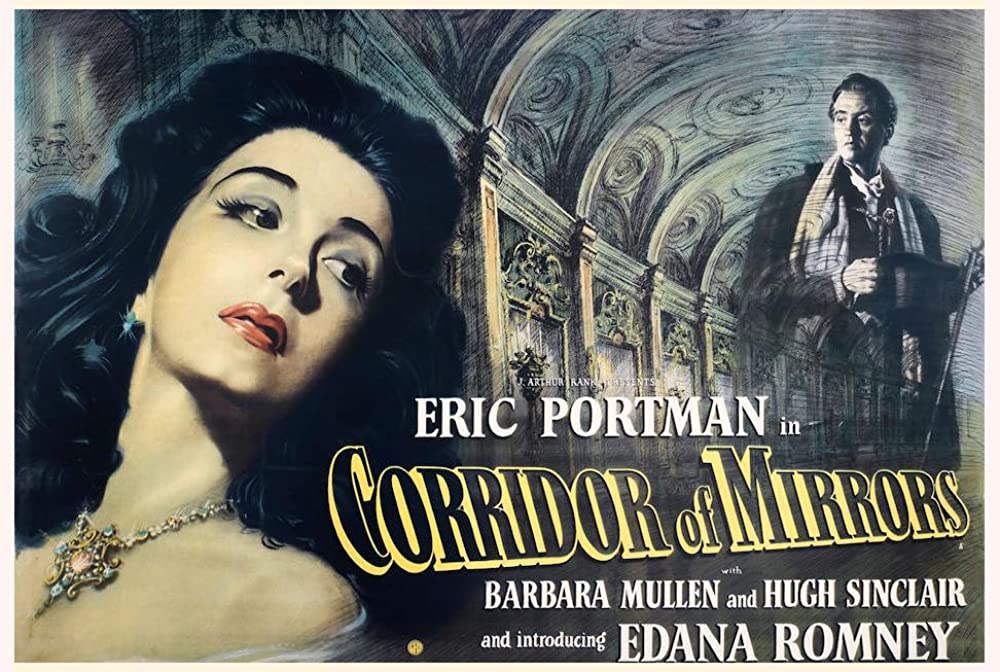Have you dipped your toes into Tubi? It’s a free app (with ads) for your smart TV that includes wonderfully obscure British films of the 1940s and ’50s from the Cohen Media Collection. So, when Phuong Le in The Guardian UK highlights a film you’ve never heard of called “Corridor of Mirrors” (1948)—containing one of the greatest British film performances by an actress you’ve also never heard of, Edana Romney—it’s Tubi to the rescue.
Let me point you toward this dreamy film about obsession with the past and the Borgias’ Italian Renaissance. “Corridor of Mirrors” is an exquisite, dark, and modern fairy tale that follows Mifanwy (the name is Welsh), a rather louche young woman who may be under a sinister spell. She accompanies Paul Mangin (Eric Portman) to a massive gloomy mansion in the heart of London in a horse-drawn cab. He’s a creepy aesthete who fancies himself a reincarnated Italian nobleman and wants the sensual Mifanwy to join him in his twisted fantasy. Down a mirrored hallway, surely heavily perfumed, meticulously reproduced 17th-century costumes beckon from behind a series of mirrored doors for a costume ball that never ends. Do Mifanwy and Paul have a sexual relationship, or is he gay? Thanks to mid-century censorship, you are left to decide for yourself.

Andre Thomas’ gorgeous cinematography reveals the film’s sumptuous costumes and elaborate decor within glistening shadows. The gowns, “which appeal to the ten-year-old girl within every female viewer,” wrote Imogen Sara Smith for Criterion, were designed by Owen Hyde-Clark and constructed by French couturier Maggy Rouff. Evocative music by George Auric, who scored Cocteau’s “La Belle et La Bête,” conjures a bewitching atmosphere, although, surprisingly, it is directed by future “Dr. No” director Terence Young in his debut. A nightclub table with Mifanwy and fellow revelers provides a brief glimpse of an impossibly young Christopher Lee in his first film, sitting with Lois Maxwell (the future Miss Moneypenny).
Edana Romay, the leading actress, crafted the part of Mifanwy for herself, collaborating on the screenplay with coproducer Rudolph Cartier, adapting a novel by Chris Massey. She moves through the film almost like a somnambulist, her somewhat-limited acting ability contributing to the dream-like atmosphere, as she is closely surveilled by a secretive woman and a fluffy white cat.
Smith, writing for the Criterion website, points out that after a war, there is such a yearning to connect with the dead that spiritualism has a brief cultural surge, and the dead certainly seem like they might walk the “Corridor of Mirrors.” But the post-war era also brings the shared experience of those women who married in haste before their husbands shipped off and find themselves coupled to virtual strangers, either because of brief acquaintance before matrimony or the brutality of war and resulting PTSD of their spouses. The film asks how much you need to know about the object of your romantic madness. Paul certainly knows nothing or cares anything about Mifanwy other than that her appearance matches a treasured portrait in his possession.

“In projecting the slow abandonment of one’s identity, her third and final performance on the big screen evokes the pleasure—and the terror of romantic submission,” Smith says. Mifanwy is a princess who, unlike Cinderella, who waits for a prince, or Snow White or Sleeping Beauty immobile without the touch of a man’s lips, must break her own spell. The film’s Gothic mood belongs to a category without a lot of others, but it does evoke both “Vertigo” (1958) and the creepy “Secret Beyond the Door” (1947), the latter in which a young bride discovers her husband collects entire rooms where murders have been committed.
Tubi allows access to, among other things, some great British films of the 1940s and ’50s from the Cohen Media Collection, which have become my new obsession. It has ads, although they are infrequent and thoughtfully placed, and it allows you to watch not just “Corridor of Mirrors” but also “Cast a Dark Shadow” (1955) with a feral young Dirk Bogarde as a “merry widow murderer” undone by his choice of victim, and “Obsession,” also known as “The Hidden Room” (1949) in which a betrayed husband holds his wife’s lover (and her adorable dog) prisoner in some war rubble until he can commit the perfect crime. You’ll have to rent “Madeleine” (1950) with Ann Todd in the title role on Amazon Prime, but this is another intriguing British film of the era—a sexy and tantalizing true crime mystery of the 1860s. Classic film lovers relish rewatches of their favorites, but there is a special pleasure in discovering a new gateway for swooning.











